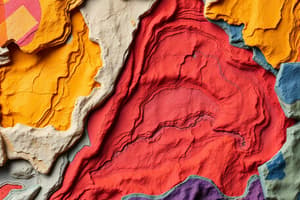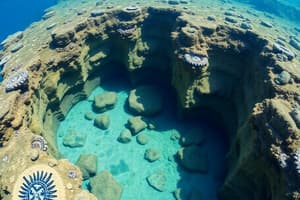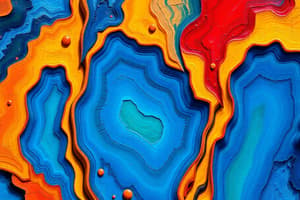Podcast
Questions and Answers
Which type of mineral would exhibit effervescence when in contact with weak acid?
Which type of mineral would exhibit effervescence when in contact with weak acid?
- Halite
- Pyrite
- Orthoclase (correct)
- Gypsum
Among the minerals listed, which one would NOT be classified as a nesosilicate based on its chemical composition?
Among the minerals listed, which one would NOT be classified as a nesosilicate based on its chemical composition?
- Chlorite (correct)
- Topaz
- Kyanite
- Zircon
Which of the following minerals is most likely to be classified as an opaque mineral?
Which of the following minerals is most likely to be classified as an opaque mineral?
- Muscovite
- Apophyllite
- Sphalerite
- Hematite (correct)
Which mineral is commonly used to represent mica minerals in lithological symbols?
Which mineral is commonly used to represent mica minerals in lithological symbols?
If a mineral has a silicon to oxygen ratio of 1:2, which silicate group does it belong to?
If a mineral has a silicon to oxygen ratio of 1:2, which silicate group does it belong to?
Which of the following minerals is least likely to effervesce when in contact with weak acid?
Which of the following minerals is least likely to effervesce when in contact with weak acid?
Which of the following mineral compositions is most characteristic of andesite?
Which of the following mineral compositions is most characteristic of andesite?
A rock sample effervesces vigorously when a weak acid is applied. Which of the following is the most likely mineral composition of this rock?
A rock sample effervesces vigorously when a weak acid is applied. Which of the following is the most likely mineral composition of this rock?
Which of the following is the most likely opaque mineral present in a metamorphic rock?
Which of the following is the most likely opaque mineral present in a metamorphic rock?
A rock sample contains visible, thin, flaky mineral grains. Which of the following mica minerals is most likely present?
A rock sample contains visible, thin, flaky mineral grains. Which of the following mica minerals is most likely present?
Which of the following lithological symbols is most likely to represent a sedimentary rock?
Which of the following lithological symbols is most likely to represent a sedimentary rock?
A rock sample contains visible, elongated mineral grains. Which of the following metamorphic rocks is most likely represented?
A rock sample contains visible, elongated mineral grains. Which of the following metamorphic rocks is most likely represented?
What is the main difference between phaneritic and porphyritic textures?
What is the main difference between phaneritic and porphyritic textures?
Which rock type is characterized by fissility, making it unsuitable for building foundations?
Which rock type is characterized by fissility, making it unsuitable for building foundations?
What is the main mineral composition of shale?
What is the main mineral composition of shale?
Why is the statement 'Slate is a sedimentary rock that shows foliation' false?
Why is the statement 'Slate is a sedimentary rock that shows foliation' false?
What property makes shale different from other rocks in terms of constructability for buildings?
What property makes shale different from other rocks in terms of constructability for buildings?
'Slate is a rock that exhibits ____ due to its metamorphic nature.' Complete the sentence.
'Slate is a rock that exhibits ____ due to its metamorphic nature.' Complete the sentence.
Study Notes
Folding and Geologic Structures
- In an eroded syncline, the youngest layer is found at the center, while the oldest layer is found at the sides.
- An anticline is formed when the oldest layer is at the center and the youngest layer is at the sides.
Silicate Minerals
- A silicon-oxygen tetrahedron is composed of 1 silicon and 4 oxygen atoms, forming a tetrahedron structure.
- Tectosilicates have a silicon to oxygen ratio of 1:2, while nesosilicates have a ratio of 1:4.
- Forsterite olivine is a nesosilicate, with a chemical formula indicating a 1:4 silicon to oxygen ratio.
Clay Minerals and Lithology
- The arrangement of clay minerals in shale is illustrated by option B, showcasing the lithology of shale.
- It is important to remember lithological symbols for future courses.
Mineral Reactions and Properties
- Calcite is a carbonate mineral that will effervesce when in contact with weak acid.
- Calcite will react with acid, even vinegar, to produce effervescence.
Mineral Identification and Rock Texture
- Among the minerals listed, calcite is the one that would effervesce when in contact with weak acid.
- Among the minerals listed, crust, Moho, Rigid upper mantle, asthenosphere, lower mantle, and D’’ Layer are opaque.
Rock Identification and Classification
- A rock with coarse crystals of plagioclase and pyroxene in a fine-grained to glassy groundmass is likely andesite or basalt.
- The presence of pyroxene, along with the fine-grained to glassy groundmass, indicates andesite or basalt.
Metamorphic Rocks
- Slate is a metamorphic rock with a likely protolith (original rock) that is mudstone.
Geologic Structures and Forces
- Fold is a structure created by compressional forces on rock layers that deformed in a plastic manner.
- Fold and reverse fault are created by compressional forces, while normal fault and rifts are caused by tensional forces or areas of extension.
- Fold is a structure created by compressional forces on rock layers that deformed in a plastic manner.
Rock Texture and Mineral Grains
- If a rock is described to have coarse/large crystals and fine-crystals that constitute part of a groundmass, it has porphyritic texture.
- Phaneritic texture is characterized by coarse-grained mineral grains that are almost the same in size, due to slow cooling.
- Porphyritic texture is characterized by a difference in size between the mineral grains and the groundmass.
Shale and Slate
- Shale is a mudrock that shows fissility, consisting of clay minerals, some quartz, and feldspars.
- Shale is not a good foundation for building construction due to its fissility, which can lead to landslides.
- Slate is a metamorphic rock that exhibits foliation, but is not a sedimentary rock.
Studying That Suits You
Use AI to generate personalized quizzes and flashcards to suit your learning preferences.
Description
Test your knowledge on geological structures like synclines and anticlines, as well as the composition of silicate minerals. Learn about the arrangement of silicon and oxygen atoms in a silicon-oxygen tetrahedron and different types of silicate minerals.




